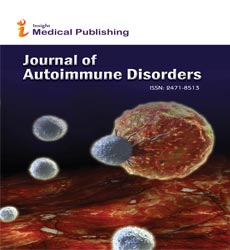Specific Aspects of the Patients Experience of Fatigue in Patients with Rheumatic Diseases in the Egyptian and Muslim Culture
Mohamed Atia Mortada
Mohamed Atia Mortada*
Lecturer of Rheumatology and Rehabilitation, Faculty of Medicine, Zagazig University, Egypt
- *Corresponding Author:
- Mohamed Atia Mortada
Lecturer of Rheumatology and Rehabilitation, Faculty of Medicine, Zagazig University
Tel: 00201091358290
E-mail: m_a_mortada@yahoo.com
Received date: January 27, 2016; Accepted date: February 19, 2016; Published date: February 25, 2016
Citation: Mortada MA. Specific Aspects of the Patients Experience of Fatigue in Patients with Rheumatic Diseases in the Egyptian and Muslim Culture. J Autoimmun Disod. 2016, 2:1. DOI:10.21767/2471-8513.100010
Copyright: © 2016 Mortada MA. This is an open-access article distributed under the terms of the Creative Commons Attribution License, which permits unrestricted use, distribution, and reproduction in any medium, provided the original author and source are credited.
Letter to the Editor
Dear editor,
It gives me great pleasure to give short notes about our study titled (Fatigue in Egyptian patients with rheumatic diseases: a qualitative study) that published in health and quality of life outcomes, August 2015 [1].
Fatigue as a chronic symptom is a well-known manifestation of many rheumatic disorders, like osteoarthritis, rheumatoid arthritis, ankylosing spondylitis, fibromyalgia, systemic lupus erythematosis and others [2].
Cultural aspects may play a role in the expression and consequences of fatigue. Up to our knowledge, Fatigue in rheumatic diseases has only been explored in Western-culture countries.
In order to increase the understanding of the fatigue experience and characteristics among Egyptian, Muslim patients with rheumatic diseases, we carried out this qualitative study.
We choose qualitative type of studies as this type helps in exploration of the patients’ point of view about the causes, consequences and management of fatigue by developing and understanding patients’ experiences of living with and managing fatigue [3].
We interviewed 60 patients (20 patients with RA, 20 patients with axial spondyloarthropathy and 20 patients with fibromyalgia) using the individual interview method [4] based on conventional qualitative content analysis, inductive reasoning, and grounded theory [5]. The participants’ experiences, opinions and concerns relating to fatigue, its patterns and consequences, and self-management strategies pertaining to this fatigue were explored.
The interesting parts in our study are that we found some aspects of the patients’ experience of fatigue specific to the Egyptian and Muslim culture such as the description of fatigue. Our patients in all disease groups tended to describe fatigue with the same concept of overwhelming tiredness and exhaustions but the fatigue experiences related much more strongly to physical aspects than a mental impact of the disease.
The response to the effect of fatigue on sexual function may also be related to the Islamic culture; women in our study had asked their husbands to marry again (which is a possibility in the Islamic culture) because of the impact of their fatigue on their sexual life, and they expressed that a second wife was the easiest solution or coping strategy for this consequence of their fatigue.
Also, the gender specific (women more than men) limitation of social activities due to fatigue was more obvious in our study than other previous studies. The cause of this difference may be that participation of women in social gatherings in the Egyptian culture is not limited to attendance (like what is expected for men); many physically demanding duties are expected from a woman at a social gathering, especially at wedding parties and condolence gatherings which were a major concern for our female patients.
Other aspects of patients’ experience of fatigue like overlap between the patients’ perception of fatigue and pain and coping strategies were similar to the findings in previous studies.
We recommended that future studies should explore further culture-specific aspects of fatigue.
It is with immense gratitude that I acknowledge the support and help of Professor Laure Gossec from Department of rheumatology, Sorbonne Universités, France for her consultative help and constructive suggestions. She is the owner of idea of this study. Also, I wish to thank, my professor and colleague Amal Abdul-Sattar for her efforts especially in interviewing our patients.
References
- Mortada M, Abdul-Sattar A and Gossec L (2015) Fatigue in Egyptian patients with rheumatic diseases: a qualitative study. Health and Quality of Life Outcomes 13:134.
- Wolfe F, Hawley DJ, Wilson K (1996) The prevalence and meaning of fatigue in rheumatic disease. J Rheumatol ;23: 1407-1417.
- Carr A, Hewlett S, Hughes R, Mitchell H, Ryan S, et al (2003) Rheumatology outcomes: the patient’s perspective. J Rheumatol 30:880-883.
- Minichiello V, Aroni R, Timewell E, Alexander L (1995) In-depth interviewing: principles, techniques, analysis. Melbourne, Australia: Longman.
- Jacelon CS, O’Dell KK (2005) Case and grounded theory as qualitative research methods. Urol Nurs 25: 49-52.
Open Access Journals
- Aquaculture & Veterinary Science
- Chemistry & Chemical Sciences
- Clinical Sciences
- Engineering
- General Science
- Genetics & Molecular Biology
- Health Care & Nursing
- Immunology & Microbiology
- Materials Science
- Mathematics & Physics
- Medical Sciences
- Neurology & Psychiatry
- Oncology & Cancer Science
- Pharmaceutical Sciences
